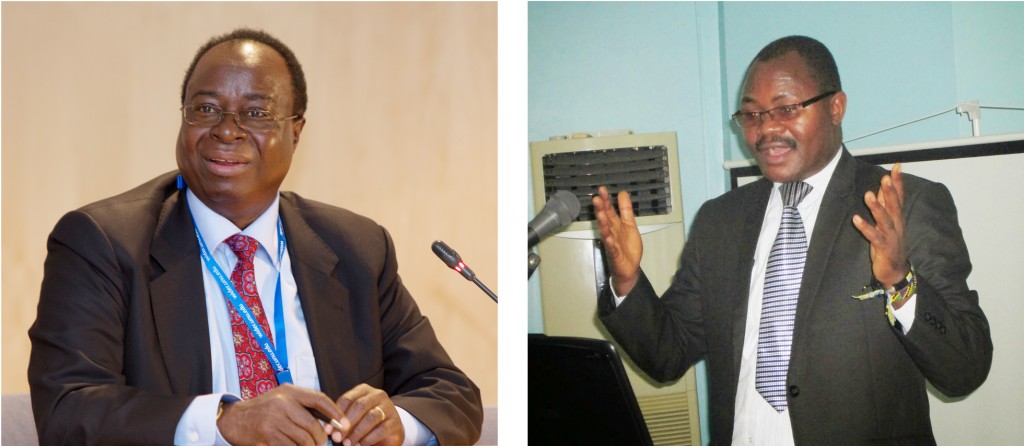
Bank of Tanzania Governor, Prof. Benno Ndulu (L), and Tanzania Financial Intelligence Unit Commissioner Onesmo Makombe.
BY JASTON BINALA.
The threat of money laundering and financing of terrorism through mobile phone money transfer has been curbed in Tanzania. The governor of the Bank of Tanzania Prof. Benno Ndulu and the Commissioner of Financial Intelligence Unit in the Ministry of Finance, Onesmo Makombe, have said the risks are under control.
Talking exclusively to this reporter on the side lines of a recent conference to launch the World Bank’s 2016 World Development Report , Prof. Ndulu said the registration of all mobile phone users has helped reduce the risks.
Mobile banking services such as M-pesa, TigoPesa and AirtelMoney, which have continued to expand rapidly in Tanzania to serve unbanked populations, particularly rural areas, have also created money laundering and financing of terrorism vulnerabilities in the financial sector, according to national security analysts.
 Officials in the bank supervision department of the Bank of Tanzania said limits were set at the beginning of mobile money transfers to permit individuals and companies to transfer up Tsh. 1,000,000/- through mobile money per day. But Special permission would be granted to corporate bodies to transfer larger amounts.
Officials in the bank supervision department of the Bank of Tanzania said limits were set at the beginning of mobile money transfers to permit individuals and companies to transfer up Tsh. 1,000,000/- through mobile money per day. But Special permission would be granted to corporate bodies to transfer larger amounts.
Religious organizations sought permission to be treated as corporate bodies and this permission was granted, after which it was noticed individual religious organizations handling up to one billion Tanzania Shillings per months. This permit has been discontinued, bank supervision officials said. Religious bodies are no longer permitted to transfer huge amounts through mobile money per day, the officials said.
The Financial Intelligence Unit received 68 suspicious transaction reports in 2013, a significant increase from 2012, according to a US Department of State Counter-terrorism document quoting intelligence reports from Tanzania; the document also says the Bank of Tanzania estimated in 2013 that the equivalent of US $650 million was transferred each month through the mobile transfer services during the period.
The 2014 counter-terrorism country report says Tanzania became a member of the Egmont Group of Financial Intelligence Units, adding that the country’s Financial Intelligence Unit received 65 suspicious transaction reports related to money laundering in 2014, a slight decrease from the 68 received in 2013.
Presenters at launching of the 2016 World Development Report said the mobile money transfer business has continued to grow in Tanzania, such that the East African nation has now overtaken Kenya as the world’s biggest mobile money transfer user.
Prof. Ndulu said it has been Tanzania’s policy to encourage adoption of new technological innovations into the market, but which are reviewed later and policy adjustments made to address risks. The central bank governor explained later that Tanzania had to have all mobile phone users registered by photo identification in order to accurately identify the service users. The identification has helped reduce risks, he said.
Earlier, FIU Commissioner told this reporter in an exclusive interview risks noticed between 2012 and 2013 had been reduced by the identification of service users but also by specialised equipment managed by the Tanzania Communications Regulatory Authority.
Mr. Makombe said through the equipment at TCRA, the government is now able to monitor every single cent being transferred through the country’s mobile phone networks so that any suspicious transfer is noticeable while the parties involved in the transfer are identified. Mobile money transfer services have grown, but the risks for money laundering or the financing of terrorism have been markedly reduced, he said.
Current Bank of Tanzania data shows the number of registered mobile phone user to be 29,126,517, up from 26,871,176 in 2012. The number of dispensers-the agents-has grown from 97,613 in 2012 to the current 119,719.
Prof. Ndulu said during the exclusive interview that huge amounts of money was currently passing through the mobile money transfers, but this was not a reflection of any suspicious transactions because it was a register of small amounts of money from an increased number of participants across the country.
The World Development Report 2016 titled ‘Digital Dividends’ discusses the world’s digital revolution which has virtually reduced the world into a small, easily accessible village. But, the report adds, the digital revolution has also come with challenges and risks some of which threaten to divide nations.
For instance, the report says, while the internet, mobile phones and other digital technologies are spreading rapidly throughout the developing world, the anticipated digital dividends of higher growth, more jobs, and better public services have fallen short of expectations, and 60 percent of the world’s population remains excluded from the ever-expanding digital economy.
Another perspective presented is that benefits of rapid digital expansion have been skewed towards the wealthy, skilled, and influential people around the world–those who are better positioned to take advantage of the new technologies.



